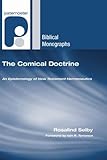
At the end of chapter 1, “Questions of Truth and Epistemology,” in her Comical Doctrine: An Epistemology of New Testament Hermeneutics (Paternoster, 2006), Rosalind Selby summarizes:
If this chapter has concluded with an appropriate understanding of the logical structure of grace and faith as we contemplate how it is that we know God, it must be important to pursue it in terms of the relationship between the individual and the community. The community of the ‘church’—however we define that—is founded by and founds its texts. This is a dialectic which itself rests in the priority of the founding acts of God. The priority over community, individual and the textual conveying of revelation always belongs with God; and the Christian will take that fundamentally seriously. (52; emphasis added)
Selby’s situation of both text and community within “the priority of the founding acts of God” allows her to recognize a kind of symbiosis between text and community while giving primacy still to the divine word.

Not dissimilarly, Ernst Käsemann too had commented years ago,
[I]n the evangelical conception, the community is the flock under the Word as it listens to the Word. All its other identifying marks must be subordinate to this ultimate and decisive criterion. A community which is not created by the Word is for us no longer the community of Jesus. . . . Correctly expressed, the relationship of the community and the Word of God is not reversible; there is no dialectical process by which the community created by the Word becomes at the same time for all practical purposes an authority set over the word to interpret it, to administer it, to possess it. Naturally, the community has always the task of interpreting the Word afresh, so that it can become audible at all times and in all places. In a certain sense it has also the task of administering it, inasmuch as it creates ways and means for the Word to make itself heard. But possess it—never. For the community remains the handmaid of the Word. If it makes the Word into a means to itself as an end, if it becomes the suzerain of the Word instead of its handmaid, the community loses its own life. The community is the kingdom of Christ because it is built up by the word. But it remains so only while it is content not to assume control over the Word—a temptation which as been a constant threat to the Church (261).
Leave a Reply